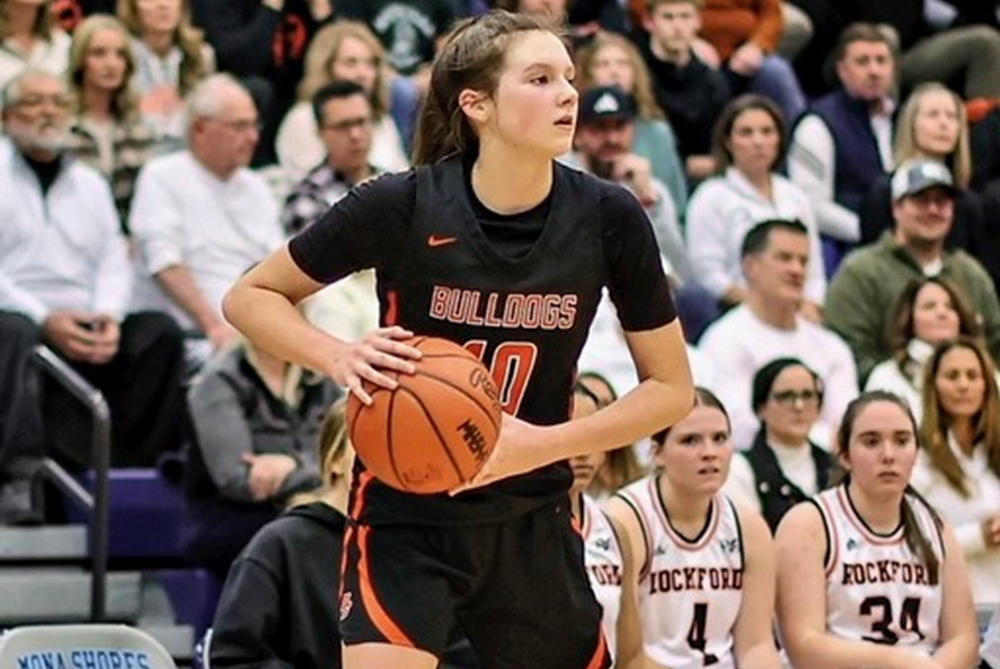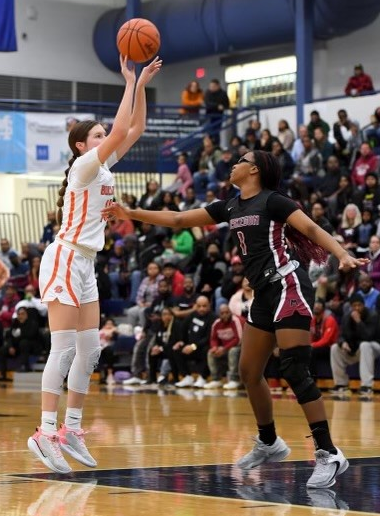
#TBT: Redettes Bring Home Class A Title
March 31, 2016
The following tells the story of the 1976 Marquette girls basketball team, still the only Upper Peninsula team to win an MHSAA Class A girls basketball championship. This piece, by MHSAA historian Ron Pesch, served as the story behind the ceremony from a “Legends of the Games” program celebrating the Redettes.
If you never have dreams, they can never come true.
For coach Barb Crill and the girls basketball team from Marquette, the dream was to win an MHSAA basketball crown.
“Barb said to us as incoming freshmen that we would win the state,” said Karen Levandoski Helmila, recalling her days as a Redette.
The girls had come close early in Crill’s tenure. In three years, Crill's squads had compiled a 52-4 record, including a 16-2 mark in 1973, a 19-1 record in 1974 and 17 straight victories the following year.
In 1974, Grand Rapids Christian eliminated the Redettes in the Regional Final. In 1975, the team averaged 68 points a game to 25.9 for the opponents. In the MHSAA District Final, Marquette downed Sault Ste. Marie, 109-16, then brushed aside Portage Central, 72-18, in the Class A Quarterfinals. However, the voyage ended abruptly in the Semifinals with a loss to Farmington Our Lady of Mercy, 62-57.
The nucleus was in place for another run at the title in the fall of 1976. The team had lost all-U.P. players Jean Moratti and Laurie Niles, but had strong replacements. The Levandoski twins, Karen and Kay, Cheryl Aho, Janet Hopkins, Sue Belanger and Caron Krueger were all seniors, and Katie Miller, a senior transfer from Eau Claire, Wis., had joined the team. Forward Shelly Chapman, a junior, also had won all-U.P. honors. Sophomores Cynde Cory and Chris Moran were expected to be the first off the bench. Sue Micklow, Kate Jennings, Lisa Coombs, Mary Erspamer, Cathy Niles and Sue Lakanen rounded out the squad. Karen Meyers, the leading scorer on Northern Michigan University's basketball team and former Redette, was returning for her fifth year as Crill's assistant.
But time was running out for the squad to achieve their coach's prophecy.
“Over the years we had played every good team in the U.P.,” said Crill. “The girls needed more.”
So on Labor Day weekend, 1976, the Redettes prepared for a trip to Detroit – their coach's old stomping grounds. Crill had arranged scrimmages against some old friends in the Motor City; among them Detroit Dominican, coached by Sue Kruszewski and winner of the Class A title in 1973 and 1974, and Harper Woods Bishop Gallagher, which had made it to the Quarterfinals in 1973.
The Marquette squad responded to the challenge, playing well in the workouts.
“The girls came back in shape from summer vacation,” Crill told the media after the trip. “Most had done a lot of work on their own, while others stayed active playing other sports.”
A native of Allen Park, Crill had started coaching and teaching in Ann Arbor Public Schools in 1959. She instituted Marquette's girls program during the 1969-70 season. “We started here before there was any MHSAA (sanctioned) ball,” said Crill. “The girls provided their own uniforms. The principal, Paul Kotila, provided a bus and driver. We played everyone with a team. It promoted a lot of the interest.”
Back in the U.P., it was business as usual. In the home opener, Marquette trounced Gladstone, 71-19, as 14 girls saw time on the court. Next, they downed Negaunee, 87-21.
Through 17 additional regular-season games, the result was the same. Omitting a 2-0 forfeit by Harbor Springs, the Redettes improved their average from 1975 to 80.8 points per contest, while decreasing their opponents’ average to 25.2 per game.
The squad dumped Escanaba, 71-29, before a crowd of about 100 for the District title at Escanaba. Shelly Chapman led the team with a season-high 33 points. In Grand Rapids for the Regionals, the Big Red Machine defeat Benton Harbor, 64-55. Leading at the half by 25 points, Crill went to the bench. Again, Chapman led all scorers with 21 points, while Krueger added 16 and Hopkins added 13.
In the Regional Final, the Redettes faced a taller Grand Rapids Union squad. Despite the partisan Union crowd and a slim three-point lead at the end of the third quarter, Marquette pulled away for a 48-34 win.
With another victory in the bag, the Redettes congratulated one another in a familiar postgame scene during the 1976 championship run. True to her words, Crill and her Marquette cagers would have a season to remember and scrapbooks to compile following their impressive run to the MHSAA title. In the Quarterfinals, the team defeated Lansing Eastern, 67-37, then disposed of Flushing, 62-46, in the Semifinals. All that remained was a rematch with Farmington Our Lady of Mercy.
This time Marquette would not be denied, downing the reigning champs, 68-41. Chapman finished with 23, Hopkins poured in 19, and Krueger hit for 14 as Crill's starting five went the entire game without a substitution.
“I was impressed with the ladies’ positive attitude as we prepared for the championship game,” said Crill, reflecting on the matchup. “They seemed quiet, very determined, very patient with one another and quite business like. I had coached many games by the fall of 1976, but I never remember another game where we planned together what to do to win, and they followed our plan perfectly.”
The team was the first Class A school from Michigan's Upper Peninsula to win an MHSAA basketball championship, a feat that has not been repeated since.
“The strength that our team held through the entire game was so strong,” said Aho Reynolds. “That's the way I felt. The more baskets we made the more we wanted. The offense and defense combined everything that night.”
“The crowd was so large for the Final game,” recalled Levandoski Helmila. “There were thousands of people watching and it seemed like only 50 cheering for us. We were glad to face the team that knocked us out of the tournament the year before. We worked together for so long to reach our goal.”
“We wanted that victory not only for the members of the team, but for our coaches, parents and community,” echoed Levandoski Angeli. “We were not only a team, but a family. Our coaches made it clear and instilled in us that no individual was a star alone.”
“Wow! It was fun,” said Hopkins, “a great ending to four years of high school basketball. We dominated the game. We were the underdog, yet we were confident and played to our strengths. Each year I played, the team improved its skill level. In my senior year everything came together and we were unstoppable! Each team member contributed to the outcome, whether it was during practice, or a game. We were focused and determined to succeed.”
“Cheryl Aho's incredible defense stands out in my mind,” remembered Coombs Gerou. “She stopped one of the leading scorers in the state. Our team defense really stood out. “Everyone played, and on any given night someone off the bench would score as much as someone who started. We all treated each other with respect and worked together as a team. Coach Crill taught me that anything was possible if you worked and prepared for it.
“Another memory was our singing on the bus, even those of us who couldn't carry a tune.”
It was one of the longer bus rides that set the foundation for that championship year.
“I think that trip (to Detroit) was the biggest difference,” said Crill. “It gave them more experience playing the type of teams they would meet in the tournament. They could see they were talented enough. They had already played the best there was. They realized they could beat them again.”

Zeinstra Finishing 4-Year Byron Center Run Among School's All-Time Greats
By
Dean Holzwarth
Special for MHSAA.com
February 15, 2024
BYRON CENTER – As an incoming freshman four years ago, Lily Zeinstra was immediately thrust into a starting role on the Byron Center varsity girls basketball team.
 While it was an overwhelming experience, Zeinstra embraced the opportunity, and believes the early demands placed on her helped pave the way for what has become an outstanding high school career – and spot among the best in school history.
While it was an overwhelming experience, Zeinstra embraced the opportunity, and believes the early demands placed on her helped pave the way for what has become an outstanding high school career – and spot among the best in school history.
“My freshman year was scary,” she said. “Just coming in and starting on varsity. And in our first game, I had to guard Jillian Brown from East Grand Rapids, who was a really good player. I feel I was pushed into a big role on our team at a really early age, but I think that has helped me over the last four years to develop into the player I am today.”
Now a senior standout, the 5-foot-11 Zeinstra has been a mainstay in the Bulldogs’ starting line-up throughout while helping lead the program to four years of success.
She recently became the school’s all-time leading scorer, surpassing 1,500 points for her career.
“I have to give credit to my teammates,” Zeinstra said. “Through the years I've been in different scoring positions, but I've always been on a team that has trusted me with the ball in tight game scenarios.
“I’ve been told by my coaches since I was younger that I'm a scorer and they need me to score, and that's been my role so I feel like scoring all those points is what I needed to do to help our team win. That’s the most important part.”
Zeinstra, who committed to Division I Butler University last spring, has been the focal point every season and has enjoyed her role as a team leader. Byron Center (14-4) is a combined 68-14 over her four seasons.
“I’ve definitely learned a lot about being a leader and having different roles that I can have on teams,” she said. “Coming in freshman year, my job was to work hard and I was one of the top defenders, so I was guarding the other teams’ best players.
“As years went on, our team lacked numbers so I became more of a scorer, especially last year. I worked on posting up down low and scoring all around the basket, and this year even more trying to further my game and score better. I'm playing college basketball next year, and that’s what they need me to do.”
Zeinstra also had the opportunity to play two years at Byron Center with her older sister, Avery, who plays now at Grand Valley State.
 “I feel like I didn’t enjoy it enough when I was in it with her,” Zeinstra said. “But I loved her class so much. There were two other seniors who she played with all four years, and they were big leaders and taught me about the culture here at Byron Center. I really enjoyed playing with them.”
“I feel like I didn’t enjoy it enough when I was in it with her,” Zeinstra said. “But I loved her class so much. There were two other seniors who she played with all four years, and they were big leaders and taught me about the culture here at Byron Center. I really enjoyed playing with them.”
Zeinstra is averaging 25 points per game this season and had a career-high 39 points against Grandville in late December.
First-year Byron Center coach Cam Burns, who replaced longtime program leader Jen Slot, knew all about Zeinstra before being hired.
“I saw her on the AAU circuit and I watched her play for a couple years, and I have friends who spoke highly of her,” Burns said. “When I got the job I wanted to check her out, and I saw her pace and how she plays the game was very special.”
Burns said Zeinstra possesses unwavering confidence and the ability to score several ways.
That mentality has come from countless hours in the gym and a strong work ethic.
“She’s one of the hardest working kids in practice, and she just wants it,” he said. “And she’s a sponge, always looking at different skills and movements to try and get a better look at the rim.
“And it’s about the time and effort she puts into the little details. She makes plays, and I’m not surprised when I see something from her on the court when others are taken back by it. She continues to show why she is so good.”
The adjustment period for Zeinstra was difficult at the onset of this season.
She was getting accustomed to a new coach, as well as a new group of varsity players after the loss of several seniors.
“It was hard at the beginning because I had been running Coach Slot’s plays and offense for three years, and I knew what to expect going into every game and every practice,” Zeinstra said. “When Coach Burns came in, he brought a different vibe and a different culture, and it was the first year I had to get used to playing with new players and a new coach. I was learning things all over again.”
Zeinstra has adapted well to her new surroundings.
“It’s been going pretty good, and we had a couple big wins last week and we are in first place in our conference,” she said. “We should be able to pull another conference championship out – fingers crossed.”
The Bulldogs are chasing their fourth straight conference championship and have a one-game lead entering Friday’s Ottawa-Kent Conference White game against Grand Rapids Forest Hills Central. Their only conference loss was against Forest Hills Northern.
“It would be such a great accomplishment to win another one,” Zeinstra said. “We have had this winning culture in our program for so long, and with getting a new coach I was worried we were going to lose some of that. But I really feel like this team is buying into everything that Coach is saying and we are finally putting the pieces together and starting to win some big games.”
After a rocky start, Byron Center has adjusted well to its new coach and made giant strides. The Bulldogs dropped their first two games of the season to East Kentwood and reigning Division 1 champion Rockford, but since have won 13 of their last 15 games.
“We started out 0-2 against two of the top teams in the state, and it was just learning a new system and a new process and feeling each other out,” Burns said. “As weeks have gone by, they are starting to trust in each other and trust me. They’ve started to trust in the process.
“After that first win we got to celebrate that, and it was special. From then on we started rolling, and we’re getting better day by day, continuing to trust in one another.”
The Bulldogs also will seek a third consecutive District crown when the postseason begins in a few weeks. Zeinstra is looking forward to a potential rematch with East Kentwood.
“I want another stab at them, and we like challenges,” Zeinstra said. “We feed off that, so I feel like we have a shot to win (Districts) again.”
 Dean Holzwarth has covered primarily high school sports for Grand Rapids-based WOOD-TV for five years after serving at the Grand Rapids Press and MLive for 16 years along with shorter stints at the Ionia Sentinel and WZZM. Contact him at [email protected] with story ideas for Allegan, Kent and Ottawa counties.
Dean Holzwarth has covered primarily high school sports for Grand Rapids-based WOOD-TV for five years after serving at the Grand Rapids Press and MLive for 16 years along with shorter stints at the Ionia Sentinel and WZZM. Contact him at [email protected] with story ideas for Allegan, Kent and Ottawa counties.
PHOTOS (Top) Byron Center’s Lily Zienstra considers her options during a game against Rockford. (Middle) Zienstra, left, puts up a shot against Muskegon. (Photos courtesy of the Byron Center girls basketball program.)

